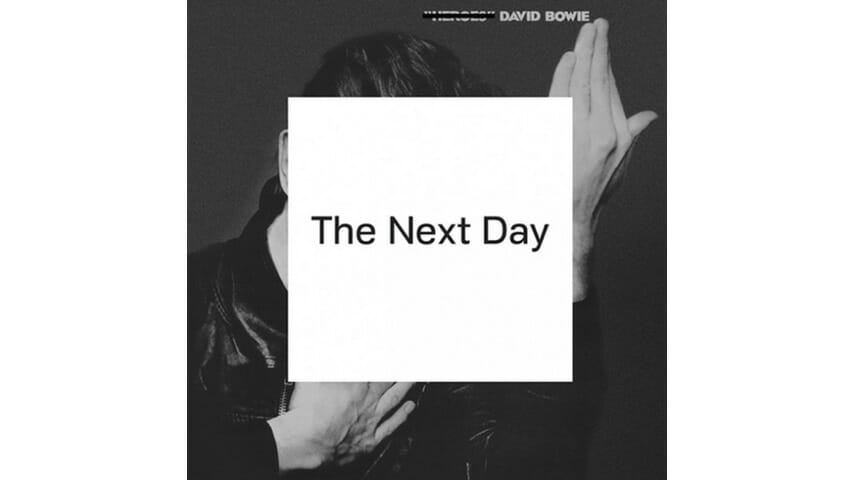David Bowie: The Next Day

David Bowie has always been a contrarian. Even during the height of his mainstream popularity in the early ‘80s, there was something vaguely sinister and uneasy about the way he endeared himself to us. Behind the designer suits and positive, ‘drug free’ messages, one could sense that constructing radio-friendly songs was just another intellectual game that Bowie was occupying himself with until the next sounds and visions came along to distract him.
The Let’s Dance era was certainly a glorious ride for Bowie and a vindication of his genius for those who had hitherto ignored his work, but it certainly wasn’t sustainable. The paradigm of icy-cool funk that “Modern Love” and “China Girl” represented couldn’t be improved upon, and for the first time in his career, David Bowie found himself in a creative corner that he had painted himself into. A decade of desperate repetition, out and out vapidity, followed by some rather desperate attempts (Outside, Earthling and Black Tie/White Noise) to regain the artistic credibility and experimental ground that he had traded away for commercial success did nothing to further his reputation or career. After a string of disappointing commercial albums such as Tonight and Never Let Me Down, it was too late to turn back; none of Bowie’s old fans were buying into his reclaimed avant-garde persona and the throngs of people who joined him with Let’s Dance had moved onto other radio-friendly artists and their pre-digested music. The unthinkable had happened: David Bowie had become irrelevant.
Things improved slightly as the new century approached. Earthling, Bowie’s drum and bass-heavy collaboration with Trent Reznor from 1997, offered a partial return to form, yet there was a palpably desperate aura around the project that suggested an artist who was desperately trying to regain his relevance. The attempt to co-opt rather than steer contemporary sounds had all of the surprise value of the disco singles that Rod Stewart and The Rolling Stones released in the ‘70s. Subsequent albums like Hours, Heathen and Reality each had some good moments, primarily because Bowie didn’t over-reach as he seemed quite content to create new material without also trying to surpass what he had done in the past. For a few years, it looked as if Bowie would be satisfied with a diminished role around the fringes of popular music, but when he suffered a heart attack after a performance during the Reality tour, he walked away, dropped off the radar and said he was finished and ready to disappear.
Until very recently, Bowie continued to maintain a low profile. When he was mentioned in the media, the stories often had more to do with rumors of poor health or with appearances at his son, Duncan Jones’ film premieres in which he was portrayed as a doting father whose own creative life was perhaps a thing of the past.
Yet, at the same time the media was speculating about the potential life-threatening diseases Bowie was contending with, the singer who grumpily told reporters that he spent his days at home watching Woody Allen movies clearly had something up his sleeve, something brewing in the lab. The fact that Bowie’s creativity was being eulogized in the press at the same time he was secretly recording a new album with Tony Visconti at the tiny Magic Shop studio in Soho, New York has already become a familiar story. Some have said that all of this recent hubbub is nothing more than a manifestion of the newest incarnation of Bowie’s continually expanding persona: Bowie as trickster, manipulator of social media and castigator of celebrity culture. While that perspective may not be entirely accurate and might be a product of wishful thinking, it’s certainly undeniable that with Bowie, it’s never been simply about the music. He’s always been about a full-spectrum presentation that includes clothes, makeup, film and visuals to offer a complete package. In that light, the Bowie that emerges on The Next Day is “archetypal artist as retired veteran” who can’t keep his opinions to himself anymore. As much as he’s tried to be the retiree “with a nice life” as he sings on “The Stars (Are Out Tonight),” the banal stupidity and vapidity of modern life that he was probably much too busy to engage with during his prime seems to have driven him around the bend to a point of absolute distraction. The sexless celebrities, formulaic music and lack of vision and risk appear to have pissed him off to such an extent that he couldn’t hold his tongue or stay away from the recording studio. All of this is great news, for Bowie has always been at his best when he’s outraged, sneering and making sure his listeners know in no uncertain terms that most of what happens around him is beneath his contempt.
-

-

-

-

-

-

-

-

-

-

-

-

-

-

-

-

-

-

-

-

-

-

-

-

-

-

-

-

-

-

-

-

-

-

-

-

-

-

-

-








































